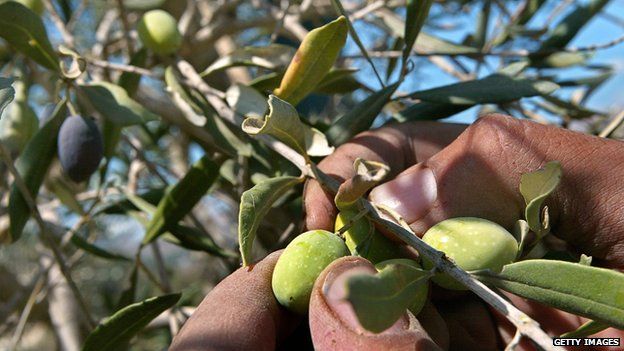A day in the life of an olive oil virgin
- Published

No olive oil you can buy will ever be as good as one you produce yourself.
Until this autumn, I was an olive oil virgin. I had had the posh stuff on salads and bruschettas, I had even spent a Christmas holiday selling it at a deli. But I had no real idea what authentic extra-virgin olive oil was for one simple reason - I had never made it.
Now I have. I had one of the most uplifting days of my life, taking fresh juicy olives from tree to bottle.
My American friend Ceil invited me to help harvest. She and her husband Erminio Cordioli own a hectare (2.5 acres) of land on the lush hills which rise up above Verona.
Erminio and his father planted most of the 350 olive trees when they bought the plot, abandoned and overgrown, 15 years ago.
Inside the olive grove, the nets laid out beneath the trees are slippery and I slide down the terraces on my behind, giggling.
Ceil has vetoed the use of noisy tree-shaking machinery. She prefers to harvest by hand, and I immediately appreciate why.
As soon as I touch my first olives, I feel a rush of excitement. They are simply beautiful - purple and green gems. It is like plucking jewels.
I discover that olive picking is the ideal rural job for a metropolitan princess.
Shaded by the trees, you do not get hot and sweaty. There is no bending or even stretching. You do not get your hands dirty.
And the best thing? You can chat on the job!
Ceil and I gossip in English while, a few trees away, Erminio and his brother-in-law banter in Veronese dialect, laughing constantly.
They are stripping the uppermost branches using rakes and a "pinza" - a simple yet brilliant gadget you drag down the branch like hair-straighteners.
The olives plop to the ground while the leaves remain intact.
I pluck and chuck with tireless zest. As we pick, Ceil explains her hopes to get a Protected Designation of Origin (PDO) certification for their oil.
To get a PDO, a product needs to be grown and processed in the region and conform to the highest quality standards at every stage.
"You have no idea how terrible uncertified oil can be," she sighs.
"Cheap olives get shipped in from anywhere, processed in Italy and labelled 'Italian extra virgin olive oil' - it's outrageous."
Obtaining a PDO is a complex, costly process of strict controls and overwhelming bureaucracy.
But if they get it, the Cordiolis will be able to market their oil as Veneto Valpolicella - renowned for its grassy, forest-fruits aroma and its sweet-spicy, green-almond flavour.
It is time to gather the nets and channel the olives into crates, before the next step of removing any stray twigs, leaves or damaged fruits.
We then load the crates into Erminio's van and drive down the hill to the olive mill.
On the road, Ceil calls the agronomist who has been advising them and monitoring their olives.
Orietta Pervan is the olive oracle. She is the leader of a tasting panel - the people who blind-sample every oil submitted.
There are 20 tests evaluating flavour, aroma and colour - and that's after going through all the chemical analyses.
The oleic-acid levels of the Cordioli oil are almost up to the required level, so Orietta is confident it will pass.
We pull up outside the olive mill and unload the crates. I am expecting rustic stone slabs and dubious levels of hygiene but it is state-of-the-art.
The olives are washed, then smashed, mashed and churned in hi-tech machines which ensure there is no contact with the air until the oil is extracted, to minimise oxidisation.
Each batch has the producer's name displayed on an electronic board alongside the current temperature - a maximum of 27C. It's the modern face of cold-pressing.
I peer into our olive incubator, churning 495kg (10cwt) of grey-green mush that will yield just 58 litres (12 gallons) of oil. Then the final stage to separate off the pulp and water.
At last the oil appears.
It trickles down a spout into a shiny silver basin with a syphoning hole in the bottom.
As the bright, greeny-gold river starts to flow, I stick my nose into the basin, inhaling the grassy scent - amazed and thrilled that I helped to make this.
Erminio and Ceil are whispering to the director, who disappears and returns with a litre bottle.
Erminio pops it under the syphon and Ceil hands it to me.
"Souvenir," she grins. "You've earned it."
How to listen to From Our Own Correspondent:
BBC Radio 4: Saturdays at 11:30 and some Thursdays at 11:00.
BBC World Service: Short editions Monday-Friday - see World Service programme schedule.